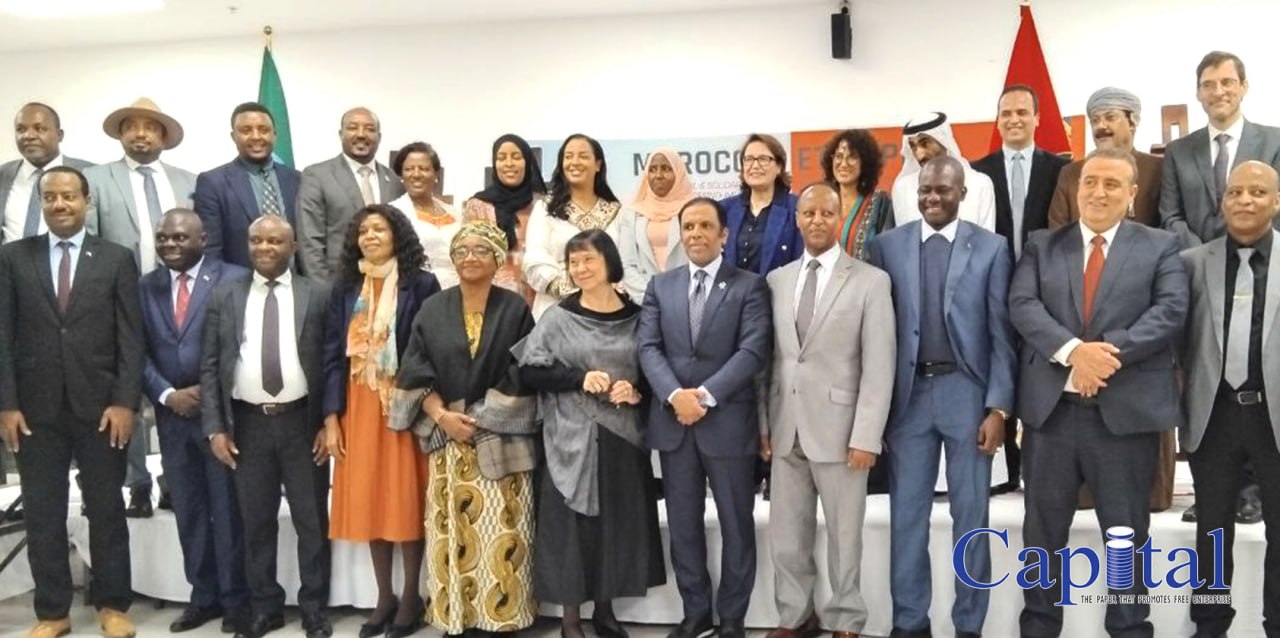The inaugural “Moroccan-Ethiopian Social and Solidarity Economy Week” recently concluded in Addis Ababa, highlighting the expanding partnership between Morocco and Ethiopia focused on enhancing women’s participation in agriculture. Held under the theme “Sustainable Entrepreneurship in Agriculture: Cooperation by Women,” the weeklong event served as a dynamic platform for collaboration, showcasing a shared vision of empowering female entrepreneurs across both nations.
Jointly organized by Ethiopia’s Ministry of Women and Social Affairs and the Embassy of the Government of Morocco in Ethiopia, the event brought together women’s cooperatives and businesses from both countries to exchange experiences, build networks, and forge lasting partnerships. A key highlight of the week was an exhibition featuring a wide array of agricultural products produced exclusively by women entrepreneurs, demonstrating their creativity and economic potential.
At the opening ceremony, Ergoge Tesfaye, Ethiopian Minister of Women and Social Affairs, underscored the deep cultural and historical ties between the two countries while emphasizing Ethiopia’s commitment to women’s economic empowerment. She highlighted that over 8 million Ethiopian women are organized into various cooperatives, collectively mobilizing more than 26 billion birr, thereby making a significant contribution to the national economy. Minister Tesfaye called for continued support in technology transfer and financial resources to further amplify these achievements.
Moroccan Ambassador Nezha Alaoui M’hammadi praised the initiative for bringing the two countries closer, focusing particularly on advancing women’s economic roles. She announced that eight Moroccan cooperatives and two prominent start-ups have committed to engaging in meaningful exchanges with Ethiopian counterparts to strengthen joint efforts.
Sara Yirga, founder and CEO of YA Coffee & Cherish Addis Women in Coffee, emphasized that the Social and Solidarity Economy (SSE) is not a fleeting trend but a transformative movement fostering equity, inclusivity, and dignity—especially for women, youth, and marginalized groups. She lauded Morocco as a continental leader in SSE and acknowledged Ethiopia’s recent strides in economic reforms that have empowered women entrepreneurs, particularly in the coffee sector. Yirga stressed the importance of collective investment and co-design to build inclusive economies where women become “architects of change.”

Nabila Tebur, General Director of BADEE, Innovx Branch of OCP Group, thanked the Ethiopian and Moroccan authorities for their collaborative support. She described BADEE as an institution dedicated to social business investment, blending profitability with social influence and prestige. Through a “co-create” approach, BADEE partners with female-led cooperatives, small businesses, and startups to develop flexible financing solutions, broaden market access, and build strong branding.
Tebur emphasized that women are “not just users, but leaders,” highlighting the creativity and courage they bring to agriculture, a sector that she described as fertile ground to “sow the seeds of change.”
Throughout the event, both Morocco and Ethiopia showcased their public policies aimed at promoting gender equality. These efforts include legal frameworks, awareness campaigns, vocational training initiatives, and direct support for women entrepreneurs. Special recognition was given to OCP Group—a global leader in soil fertility and plant nutrition—for its significant investments and land-based projects that specifically focus on empowering women and youth.
The “Moroccan-Ethiopian Social and Solidarity Economy Week” has thus not only celebrated the achievements of women in agriculture but has also paved the way for deeper bilateral cooperation and shared innovation, positioning women as key drivers of sustainable development in the region.



